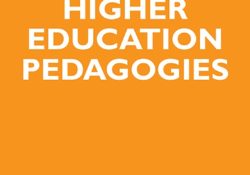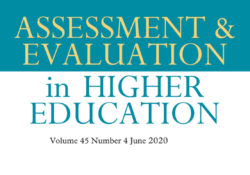eric.ed.gov har udgivet: In collaboration with two other research organizations, the authors integrate principles of the BEAR Assessment System with Universal Design for Learning principles to develop and validate learning progressions and an aligned, universally designed formative and summative classroom assessment system for promoting conceptual understanding of number sense/operations for students with Math Learning Disabilities (MLD). This research will help to create an effective and validated formative assessment system for meaningfully and validly diagnosing and promoting student learning outcomes on constructs central to number sense and operations for whole numbers up to and including elementary fractions. The assessment system will offer a powerful tool that will provide teachers cutting edge research and empirically based resources for validly monitoring student knowledge and progress, meaningfully interpreting evidence about student learning from formative… Continue Reading →
Like this:
Like Loading...
eric.ed.gov har udgivet: Single-sex educational environments can create young women who are engaged, active leaders. Girls receive differential treatment in combined-sex education environments. Girls often do not receive the encouragement or instruction to assume leadership. I want to identify the elements of single-sex education that foster female leadership and consider their application in the public education system. The literature in the field clearly indicates that girls and boys develop differently, learn differently, and therefore have unique needs in education. While girls in education have made great strides in the last forty years, a gender gap still exists in education. Girls‛ test scores have improved drastically in the areas of math and science since the 1980s, but girls enrollment in math and science courses are still not equal to that of… Continue Reading →
Like this:
Like Loading...
eric.ed.gov har udgivet: For almost 50 years, ACT has played a pivotal role in promoting student access into and success in science, technology, engineering, and mathematics (STEM) careers. Through academic and career assessments, career development tools, and extensive research, they have helped inform students, parents, teachers, career counselors, employers, and policymakers about the skills that are needed to perform effectively in STEM fields. ACT’s EPAS[TM] (Educational Planning and Assessment System) is the only longitudinal assessment system that begins measuring students‛ college readiness in middle school and follows students into high school and college to evaluate their persistence and success. What ACT’s research shows is clear: The students most likely to major in STEM fields in college and persist to earn their degrees are those who develop interests in STEM careers… Continue Reading →
Like this:
Like Loading...
eric.ed.gov har udgivet: To help the United States stay globally competitive in terms of innovation and invention, the teaching of science, technology, engineering, and mathematics (STEM) has become a priority in P-12 education today. As the need for students to become stronger in STEM grows, so does the need for well-qualified STEM teachers who understand what is needed to develop relevant and high-quality STEM programs. Professional development (PD) can offer opportunities for those involved in the teaching of STEM to learn how to effectively integrate various instructional approaches, including „engineering design‟ into their teaching and learning environments. Professional development is important to STEM education, especially in the areas of technology and engineering. If engineering is to be recognized as an integral part of science, technology, and math education, stakeholders, organizations… Continue Reading →
Like this:
Like Loading...
eric.ed.gov har udgivet: Due to the increasing achievement gap between schools of urban settings and their suburban counterparts, and in an environment where statewide testing that may begin to hinder the graduation of many urban students, there is a need to close the gap especially in the areas of Math and Science. Teachers in such environments face the daunting task of accelerating learning for urban students in two arenas: conceptual and affective. The conceptual tasks observed during this study included: building up the basic skills of students, developing literacy and proficiency around test taking, as well as completing the curriculum for Calculus. The primary affective tasks observed during this study included: confidence (swagger) development; positive interaction around the „Truth‟ of their academic status; and work ethic development. In order to… Continue Reading →
Like this:
Like Loading...
tandfonline.com har udgivet en rapport under søgningen „Teacher Education Mathematics‟: Developing a revised social force model for pedestrians’ earthquake emergency evacuation Link til kilde
Like this:
Like Loading...
tandfonline.com har udgivet en rapport under søgningen „Teacher Education Mathematics‟: ABSTRACT ABSTRACT Technical writing skills are vital to professional engineers, but many engineering students find them difficult to master. This paper presents a case study carried out among ~300 first and second year engineering students who had little previous experience in technical writing. The aim was to support them to write better technical reports. Students were asked to write an 800-word report following an experimental laboratory and to include written reflection on their work. This improved writing skills (as measured by mark awarded and by questionnaires completed by students before and after the activity) by encouraging self-regulation and had the additional benefit that students were more satisfied with and engaged with the feedback they received on their work. Link til… Continue Reading →
Like this:
Like Loading...
tandfonline.com har udgivet en rapport under søgningen „Teacher Education Mathematics‟: ABSTRACT ABSTRACT While scholars have proposed different models of language assessment literacy (LAL), these models have mostly comprised prescribed sets of components based on principles of good practice. As such, these models remain theoretical in nature, and represent the perspectives of language assessment researchers rather than stakeholders themselves. The project from which the current study is drawn was designed to address this issue through an empirical investigation of the LAL needs of different stakeholder groups. Central to this aim was the development of a rigorous and comprehensive survey which would illuminate the dimensionality of LAL and generate profiles of needs across these dimensions. This paper reports on the development of an instrument designed for this purpose: the Language Assessment Literacy… Continue Reading →
Like this:
Like Loading...
eric.ed.gov har udgivet: Communication in the mathematics classroom is currently viewed as an integral part of mathematics instruction. This paper explores the usefulness of math penpal letters as a means of increasing the quality of written communication in mathematics. The focus of this study is the letter writing exchanges between a class of 4th-grade students (n=28) and preservice teachers (n=27) attending a mathematics education course. The letter exchanges occurred over a period of three months, and the writing was examined for its content and style. It also served as a window through which teachers could glean some otherwise inaccessible information about students. Explorations into writing math penpal letters attest to their richness and potential for developing written communication in mathematics. The penpal exchanges also helped preservice teachers think about mathematics… Continue Reading →
Like this:
Like Loading...
tandfonline.com har udgivet en rapport under søgningen „Teacher Education Mathematics‟: Abstract Abstract There is an increasing focus on notions of feedback in which students are positioned as active players rather than recipients of information. These discussions have been either conceptual in character or have an empirical focus on designs to support learners in feedback processes. There has been little emphasis on learners’ perspectives on, and experiences of, the role they play in such processes and what they need in order to benefit from feedback. This study therefore seeks to identify the characteristics of feedback literacy – that is, how students understand and can utilise feedback for their own learning – by analysing students’ views of feedback processes drawing on a substantial data set derived from a study of feedback in… Continue Reading →
Like this:
Like Loading...


